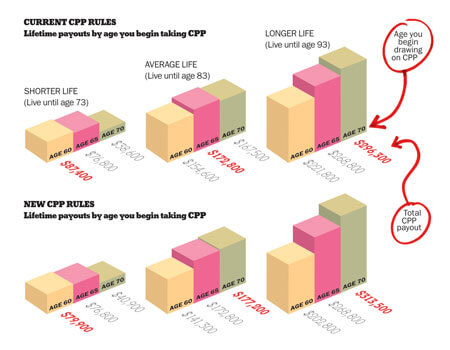When is the best time to start taking CPP?
Good things come to those who wait.
Advertisement
Good things come to those who wait.
 Methodology:
1. All figures are in current 2011 dollars, to reflect current purchasing power which removes the effects of inflation. (CPP pensions are indexed for inflation so amounts will keep pace with inflation.) We have based the figures on the example of a CPP pension paying $800 a month if started at the regular retirement age of 65, which is less than the current maximum of $960 a month. No adjustment has been made for the time value of money.
2. Life expectancy at age 60, average of male and female. Source: Statistics Canada.
3. CPP pensions are reduced in 2011 by 6% a year for each year they are started earlier than the regular retirement age of 65, to a maximum of 30%. A larger reduction factor will be phased in during the period 2012-2016, after which pensions will be reduced by 7.2% a year for each year they are started early, to a maximum of 36%. The pension example we used pays $560 a month if started in 2011 at age 60. It will instead pay $512 a month in today’s dollars if started in 2016 or subsequently at age 60. The new adjustment factors will not affect pensions started in prior years.
4. CPP pensions are increased in 2011 by 6.84% a year for each year they are started later than the regular retirement age of 65, to a maximum of 34.2%. A larger increase will be phased-in until 2013, when pensions will be increased by 8.4% a year for each year they are started later, to a maximum of 42%. The pension example we used pays $1,074 a month if started in 2011 at age 70. It will instead pay $1,136 a month in today’s dollars if started in 2013 or subsequently at age 70.
Methodology:
1. All figures are in current 2011 dollars, to reflect current purchasing power which removes the effects of inflation. (CPP pensions are indexed for inflation so amounts will keep pace with inflation.) We have based the figures on the example of a CPP pension paying $800 a month if started at the regular retirement age of 65, which is less than the current maximum of $960 a month. No adjustment has been made for the time value of money.
2. Life expectancy at age 60, average of male and female. Source: Statistics Canada.
3. CPP pensions are reduced in 2011 by 6% a year for each year they are started earlier than the regular retirement age of 65, to a maximum of 30%. A larger reduction factor will be phased in during the period 2012-2016, after which pensions will be reduced by 7.2% a year for each year they are started early, to a maximum of 36%. The pension example we used pays $560 a month if started in 2011 at age 60. It will instead pay $512 a month in today’s dollars if started in 2016 or subsequently at age 60. The new adjustment factors will not affect pensions started in prior years.
4. CPP pensions are increased in 2011 by 6.84% a year for each year they are started later than the regular retirement age of 65, to a maximum of 34.2%. A larger increase will be phased-in until 2013, when pensions will be increased by 8.4% a year for each year they are started later, to a maximum of 42%. The pension example we used pays $1,074 a month if started in 2011 at age 70. It will instead pay $1,136 a month in today’s dollars if started in 2013 or subsequently at age 70.
Share this article Share on Facebook Share on Twitter Share on Linkedin Share on Reddit Share on Email